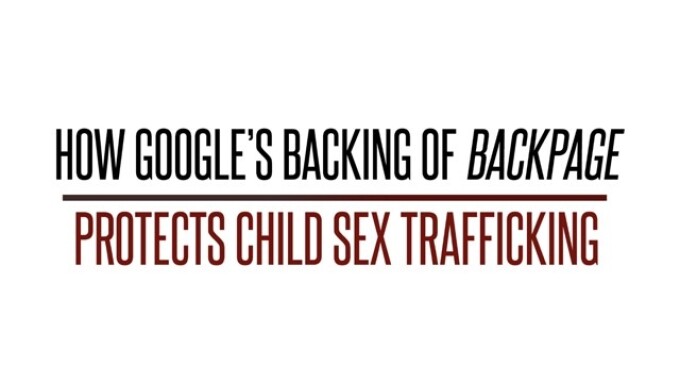LOS ANGELES — The foes of free expression are at it again, this time touting a new report that names Google a defender of “America’s Top Pimp” due to its support of commonsense communications laws.
Released last week, the report by Consumer Watchdog, Faith and Freedom Coalition, Trafficking America Taskforce, DeliverFund, and The Rebecca Project, documents Google’s financial backing of the effort to protect Backpage.com from an onslaught of legal attacks by anti-porn zealots and other groups opposed to freedom of expression by consenting adults, who claim the site is “notorious for facilitating prostitution and sex trafficking.”
These groups claim Google financially supported the filing of amicus briefs on Backpage.com’s behalf, “distorting Section 230 of the Communications Decency Act (CDA) to defend the company’s actions,” while also supporting lobbyists’ efforts to educate lawmakers about the CDA and the importance of its “safe harbor” provisions.
“Why would Google be interested in defending such a company?” the report asked. “In short: business.”
While the motivation of any business is “business,” the report outlines several factors that are also of concern to piracy-plagued porn producers, some of whom might take exception to the breadth of CDA coverage as well — making for strange bedfellows in agreement on this topic.
“The groups’ defense of Backpage centers around Section 230 of the Communications Decency Act, a 1996 law that Google says provides it with almost unlimited immunity from liability for crimes committed using its services,” the report explained. “That includes the posting of pirated movies and music to its YouTube service, fraudulent advertisements posted through its AdWords service or Google suggesting trademarked terms as advertising keywords.”
Although it’s doubtless the anti-porners are not concerned with our piracy plight, they are concerned that companies might offer a service they have no control over.
“There can be no doubt that Backpage’s entire business model is built on sexual exploitation, and that as such, Backpage’s CEO and founders represent America’s top pimps,” said Dawn Hawkins, Executive Director of the National Center on Sexual Exploitation. “What will come as a shock to many is that Google — a company with the motto ‘Don’t be Evil’ — has aggressively buttressed the legal defense of Backpage.com in an effort to protect its own corporate interests, according to the report.”
Recent court cases have favored Backpage.com since Section 230 of the CDA provides sites hosting third-party content with certain immunities over the material being posted.
“We believe that the Backpage.com case is fundamentally different as evidence suggests that the company proactively coaches sex traffickers about how to post ads for underage victims in order to avoid detection by legal authorities,” Hawkins added. “We believe that reasonable reforms to Section 230 are essential to ensure that companies like Backpage.com can no longer hide behind the safe harbor provisions of the law when they knowingly and with reckless disregard allow sex-trafficking ads to be posted on their site.”
This ongoing saga should be followed by all adult website operators as its outcome could directly impact their day-to-day business — with some companies benefiting regardless of where the ax will fall in this case that could put an end to tube sites and other venues long considered “bad for the porn business.”






